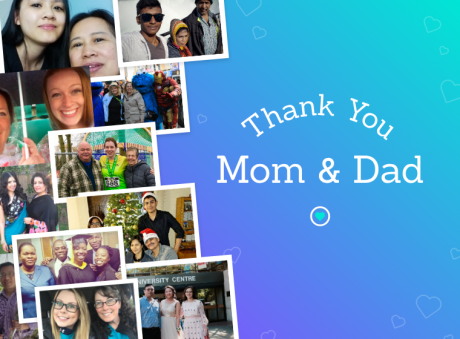The words “re-entering post-secondary” seem straightforward. However, re-entering students are often confused with second-degree students and mature students. The former return to university to complete another bachelor’s degree in a different discipline. The latter enter university after turning 21 years old. Neither are re-entry students.
So What Is Re-Entry?
Re-entry is often confused with continuing studies. Students of continuing education programs take courses to acquire job-specific knowledge and skills. This is very different from re-entry. In fact, re-entry is not the same as any of the student statuses I’ve mentioned. Instead, re-entering post-secondary education is what happens when students return to university or college to complete the degree or diploma they initially enrolled in after not taking any university or college courses for a certain amount of time.

Re-entering students might have left university for various reasons. They include paid or volunteer work, travel, health or family issues, suspension, probation, not feeling prepared, or a combination of these. For more information on reasons why students take time off post-secondary studies, check out this piece by Top Universities. I’m a recent graduate from the University of Toronto Scarborough (UTSC) who re-entered in 2017 after a semester-long leave for my co-op work term and illness recovery. These are my tips on how to make the most of your re-entry experience:
What Does It Feel Like? And How Can I Make The Most Of It?
Mentally prepare yourself. Many students anticipate a smooth and easy re-entry experience, but transitions are rarely easy. Change takes a while to adapt to. And it’s much easier to deal with when you are aware and prepared. Your ability to adapt to this change is one of the most crucial determinants of your success during the re-entry process. In case you want to read more about the importance of adapting to change in post-secondary studies, check out this piece by College Parent Central.
One of the first changes students often experience is the change in routine. Regardless of what experience you are returning to post-secondary from, give yourself time to adjust to these changes. If you have children, try to make child care arrangements well in advance. Remind yourself that you are still re-adjusting to post-secondary life. So go easy on yourself, especially in your first semester back. If possible, try limiting other responsibilities such as volunteering, extra-curricular activities, or part-time work.

Besides the new routine (or the absence of it), many other unexpected changes often accompany the re-entry experience. These changes include new professors, new courses to substitute for prior program and degree requirements, or new assignment submission procedures. Try calling (or even better, visiting) your registrar’s office, academic advising, campus technical support, and other similar support services. See if there are any recent changes of which you should be aware. It is also wise to check in with friends who are currently attending the university or college you plan on re-entering into to get an insider’s perspective on how to adapt to any changes.
What If I’m Re-Entering Following A Traumatic Experience?
If you are re-entering university having lived through a traumatic experience, some course content might trigger you. This situation is especially pronounced if your program deals with difficult material which may remind you of your personal experiences. This could include lectures and readings on suicide, mental illness, or racism. I know this all too well. Although it can be challenging, you can do very well as long as you keep these next three tips in mind:
Find The Right Support.
Figure out who might be willing to invest their time and energy into support you during your re-entry experience. Start by chatting with your family to see how they can assist you during re-entry. Your family’s help, whether it be caring for your child or cheering for you when you lose confidence in your performance, will make a massive difference to the outcome of your re-entry. Additionally, try taking at least one course with a close friend or professor who is willing to support your growth and accommodate you when necessary. And when you feel triggered by course materials, consider these free counselling supports.

Recognize The Structural Shapers Of Your Experience.
I was first introduced to the Sociological Imagination Framework by C. W. Mills in my re-entry semester back in January of 2017. His work bridges the personal and the public by connecting individuals to their society. In Mills’ own words:
“Neither the life of an individual nor the history of a society can be understood without understanding both.” – C.W. Mills
This framework allows us to understand our struggles as being shaped by the world around us and the organizations embedded within it. Mills’ work empowered me to balance responsibility for my circumstances; my experiences with depression, anxiety, bronchitis, prescription medication dependence, failures, and traumatic experiences, aren’t entirely my fault. I am also the product of problematic health care, education, social service, and transportation systems. So why does this knowledge make things any better?Because it could motivate you to focus your studies and future work on trying to eliminate structural and systemic barriers to your success and well-being through your studies and the future work that you do, as these barriers can certainly be removed. This can range from researching the cure for a contagious disease you had to advancing policies that improve the well-being of others with similar experiences

Be Bold: You Survived It.
Finally, adopt a fearless mentality. In my program, I’m always learning about depression, prescription medication dependence, and overcoming trauma. Triggering, without a doubt. But I have to remind myself: I survived it. Remind yourself that while most students might be engaging with difficult course material from a distance, you have lived experience with this topic. Your lived experience will not only help you better understand course materials but also apply what you learned in your daily life. This wisdom gives you the extra edge needed to succeed. Use this edge to your advantage.

Write a thank you letter to the most important people in your life for your chance to win $20,000.
*Opinions expressed are those of the author, and not necessarily those of Student Life Network or their partners.




